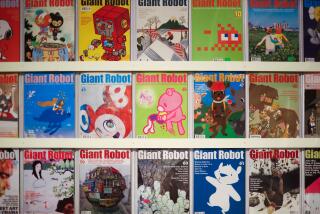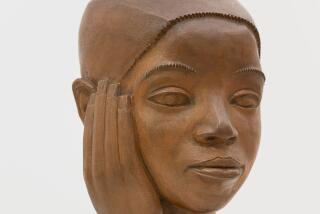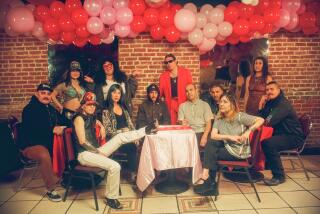Art of urgency
“Big Head” began with the letters.
In 1942, 20-year-old Masamori Kojima meticulously typed a series of missives from behind barbed wire, describing his experience in an Arkansas internment camp. Like 120,000 other Japanese Americans, Kojima was incarcerated during World War II. Five decades later, his great-niece, performance artist Denise Uyehara, discovered carbon copies of those letters.
“We always knew Masamori as the black sheep of the family,” Uyehara says. “It turned out that he used to work for Tom Bradley in the mayor’s office and did a lot of civil rights work, but we didn’t know all that when I was a kid. When he passed away, we went through his house and my mother collected all his things, and she’s like, ‘You’re the artist, you take this stuff.’ So for 10 years, I was schlepping boxes and manuscripts of his.”
Though Uyehara’s parents had also been incarcerated during the war, they didn’t discuss the subject much when she was growing up in Orange County.
It was her grandmother who made a point of sharing memories about the camps.
“My grandmother would be making cookies and things, and she’d tell us how horrible it was. She was always very clear about that, and she’d say, ‘I’m going to tell you this so you won’t let it happen again to anybody.’ ”
About three years ago, Uyehara finally got around to taking a close look at her great-uncle’s letters, preserved on yellow, tissue-thin paper. Though best known for 1995’s “Hello (Sex) Kitty: Mad Asian Bitch on Wheels,” Uyehara had drawn on her family heritage for previous shows, notably the 1993 performance piece “Headless Turtleneck Relatives.” During the summer of 2001, Uyehara found herself intrigued with her great-uncle’s writings but hadn’t yet figured out how to build a show around the letters.
After Sept. 11 and the ensuing hate crimes directed toward Muslims and Arab Americans, Kojima’s internment-camp accounts took on fresh urgency. It dawned on Uyehara that she could become a conduit not just for her family history, but also for the new group of citizens who were suddenly being scrutinized with suspicion.
“It was kind of like a nightmarish feeling, and then the ancestral memory made me think, ‘Oh my God, the same thing is going to happen again.’ And I realized, this is what I’m supposed to do, as an artist, to help people remember and make sense of a very difficult time.”
The resulting performance piece, “Big Head,” opening Friday, incorporates Claymation, movement, projected images and monologues to explore themes of memory, race, religion and civil rights.
To broaden the scope of her show, Uyehara needed to make connections with Los Angeles’ Arab American community. She called on Tamadhur Al-Aqeel. A director, actress and radio commentator raised in Arizona by her Kuwaiti father and Greek mother, Al-Aqeel was mindful of a 1986 proposal from the Immigration and Naturalization Service. “It was a reaction to the stuff that was happening in Lebanon and Libya,” she says. “The INS put together this thing to round up Arab Americans and put them in camps in Oakdale, La.” Though the plan was never implemented, Al-Aqeel says the fact of its existence emblematized how fragile civil rights can become in time of war.
One of the “Big Head” segments includes a videotaped vigil organized on behalf of Arab Americans and held in front of the Japanese American National Museum in downtown L.A. “I had no idea that Japanese Americans were so concerned about what might happen to Arab Americans here,” Al-Aqeel says. “To realize there’s this other group of people who are completely safe, in terms of public opinion, and yet they’re having these public demonstrations of solidarity -- I never thought of that link, personally. The fact that Japanese Americans started speaking out was really touching.”
“Big Head” draws from interviews with Edina Lekovic, a Bosnian-born Muslim who edited the UCLA student newspaper Daily Bruin in the late ‘90s and is now managing editor of the Minaret at the Muslim Public Affairs Council; Lillian Nakano, an internment camp survivor and civil rights activist; Lulu Emery, a Palestinian native who now lives in Canyon Country; and Egyptian American Shady Hakim, who serves as the Middle East education coordinator at the American Friends Service Committee.
Hakim was friends with the uncle of Adel Karas, 48, a Coptic Christian grocer from Egypt who was killed in his San Gabriel store four days after the Sept. 11 attacks.
Another violent incident inspired a “Big Head” Claymation sequence. Working out of the studio/living space she inhabits at the 18th Street Arts Complex in Santa Monica, Uyehara sculpted a series of contorted clay figures after she heard news reports about a group of South Asians who attacked an Indian man, mistaking him for a Middle Easterner, as he left an Anaheim karaoke bar.
“They beat him so badly they broke his jaw and it had to be wired shut for eight weeks,” Uyehara says. “It made me realize even my own people have this potential to hate and made me wonder: What is it like to hate somebody so much that you actually hit them? What is it like to attack?
“It was very odd to make a hole in the clay figure’s stomach, as if you were leaving that imprint on somebody’s body. It brings home the idea that if you go to war with another country, you are going to hurt other people and they’re going to feel it physically.”
Uyehara, who confesses that she used to fall asleep in history class when she was a girl, says working on “Big Head” heightened her appreciation for the connection between past and present.
“The piece is about how our heads are filled with all these voices from the past. It’s also about how we act on those memories. That’s how we make history real.
“Some people think history’s just about dead people who come and go. And before, I didn’t connect much with history.
“Now, I’m like, ‘Oh, this is why history’s important: so that we remember, and also so we realize that history is about individuals taking action.’ ”
*
‘Big Head’
Where: Highways Performance Space, 1651 18th St., Santa Monica
When: Friday and Saturdays, 8:30 p.m.; Sundays, 2 p.m.
Ends: March 2
Price: $15
Contact: (310) 315-1459
More to Read
The biggest entertainment stories
Get our big stories about Hollywood, film, television, music, arts, culture and more right in your inbox as soon as they publish.
You may occasionally receive promotional content from the Los Angeles Times.










